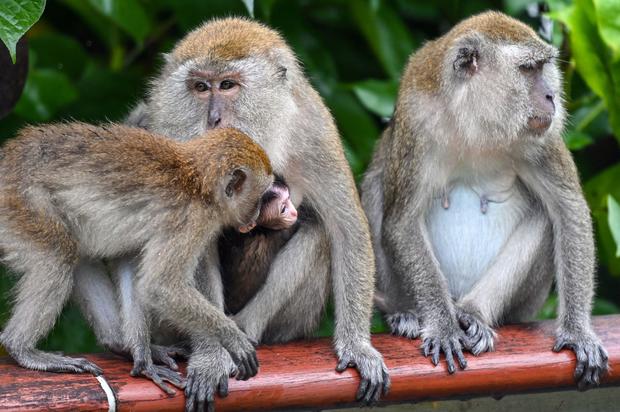ROSLAN RAHMAN/AFP via Getty Images
Miami — Federal prosecutors have charged eight people with smuggling endangered monkeys, including a Cambodian wildlife official who was arrested in the U.S. while traveling to a conference on protecting endangered species.
The official, plus a colleague in that country’s wildlife agency and six people connected to a Hong Kong-based company were involved with breeding long-tailed macaques for scientific and academic research and supplying them to labs in Florida and Texas. But the group is accused of illegally purchasing wild macaques for the business when they lacked supply from their breeding operations.
Long-tailed macaques, sometimes known as crab-eating macaques, are protected under international trade law and special permits are required to import the animals into the U.S.
Masphal Kry, the deputy director of Wildlife and Biodiversity in Cambodia’s Ministry of Agriculture, Forestry and Fisheries, was arrested Wednesday at John F. Kennedy International Airport in New York.
Kry, 46, was traveling to Panama to attend an international meeting on regulating trade in endangered species, said a U.S. official on the condition of anonymity to discuss the ongoing investigation.
Omaliss Keo, 58, director general of the Southeast Asian country’s Forestry Administration, is also charged in the eight-count indictment, along with six employees of Vanny Resources Holdings. Officials didn’t say whether anyone besides Kry had been taken into custody. They each face up to 145 years in prison.
“The macaque is already recognized as an endangered species by the International Union for the Conservation of Nature,” U.S. Attorney for the Southern District of Florida Juan Antonio Gonzalez said in a statement. “The practice of illegally taking them from their habitat to end up in a lab is something we need to stop. Greed should never come before responsible conservation.”
According to the indictment, Vanny founder and owner James Man Sang Lau, 64, and Vanny general manager Dickson Lau, 29, operating from Hong Kong, owned and managed several corporations that conspired with black market collectors and officials in Cambodia to acquire wild macaques and export them to the U.S., falsely labelled as captive bred.
The macaques were taken from national parks and other protected areas in Cambodia to breeding facilities where they were provided false export permits, officials said. Ministry of Agriculture, Forestry and Fisheries officials received cash payments of $220 each in exchange for a collection quota of 3,000 “unofficial” monkeys.
“Wild populations of long-tailed macaques, as well as the health and well-being of the American public, are put at risk when these animals are removed from their natural habitat and illegally sold in the United States and elsewhere,” U.S. Fish and Wildlife Service Office of Law Enforcement Assistant Director Edward Grace said.
The conference in Panama, bringing together delegates from 184 parties to the Convention on International Trade in Endangered Species of Wild Fauna and Flora, includes a Nov. 23 event on threats to the very species the Cambodian officials are accused of trafficking.
The long-tailed macaque is the most heavily traded primate on the CITES database, almost exclusively for laboratory research. According to the CITES Trade Database, more than 600,000 were exported and declared born or bred in captivity from 2011 to 2020. Almost 165,000 live specimens were exported in 2020 alone.
Stay connected with us on social media platform for instant update click here to join our Twitter, & Facebook
We are now on Telegram. Click here to join our channel (@TechiUpdate) and stay updated with the latest Technology headlines.
For all the latest Education News Click Here

